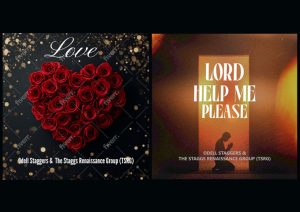Swiss singer-songwriter MADNIK, born Nicola Theurillat, continues to carve out a distinctive space in the music world with his emotionally charged soundscapes. His latest track, “Be Here to Love Me,” is a centerpiece of his critically praised EP ‘Rainy Days at Home’. It reimagines the Townes Van Zandt classic as a delicate, modern meditation on love, longing, and the bittersweet ache of impermanence. With his trademark fusion of haunting minimalism and heartfelt lyricism, MADNIK transforms the song into a deeply personal anthem of vulnerability. This rendition showcases the artist’s ability to blend the timeless themes of the original with his signature style, creating a track that resonates across generations and genres.
At the heart of “Be Here to Love Me” is MADNIK’s voice, an instrument of stunning emotional clarity. There is a raw, unpolished beauty in his delivery, as if each note carries the weight of an unspoken truth. His phrasing feels conversational yet poignant, inviting listeners into a deeply personal exchange.
The opening line, “Your eyes seek conclusion in all this confusion of mine,” sets the tone with its quiet yearning. In MADNIK’s hands, this lyric becomes more than a statement—it’s a fragile confession, underscoring the human need for connection amidst uncertainty. The natural intimacy of his voice makes the listener feel as though they are sitting beside him in a dimly lit room, sharing in his emotional vulnerability.
 MADNIK’s vocal performance doesn’t just carry the words; it lives within them. His voice ebbs and flows with the emotions of the song, from the restrained sorrow in the verses to the quiet desperation of the refrain, “Hold me and tell me you’ll be here to love me today.” This plea, repeated like a mantra, forms the emotional core of the track, resonating deeply with anyone who has ever longed for the certainty of love in an uncertain world.
MADNIK’s vocal performance doesn’t just carry the words; it lives within them. His voice ebbs and flows with the emotions of the song, from the restrained sorrow in the verses to the quiet desperation of the refrain, “Hold me and tell me you’ll be here to love me today.” This plea, repeated like a mantra, forms the emotional core of the track, resonating deeply with anyone who has ever longed for the certainty of love in an uncertain world.
The production of “Be Here to Love Me” is a study in restraint. Built around a softly resonant piano line, the arrangement strips the song to its essence, creating a space for the emotions to take center stage. The quiet presence of atmospheric elements—a faint echo here, the suggestion of falling rain there—adds subtle layers of depth without overwhelming the simplicity of the performance.
The sparing use of instrumentation amplifies the song’s intimacy, allowing the listener to focus on the interplay between MADNIK’s voice and the melancholic piano chords. The result is a sonic environment that feels simultaneously expansive and deeply personal, as if the track exists in a world suspended between dream and reality.
This minimalist approach highlights MADNIK’s strengths as a storyteller. Rather than relying on complex production to convey emotion, he lets the purity of the song’s melody and lyrics speak for themselves. It’s a choice that mirrors the theme of the song itself: finding beauty and solace in simplicity, even amid life’s chaos.
The lyrics of “Be Here to Love Me” are a masterclass in poetic economy, painting vivid imagery while leaving space for interpretation. Originally penned by Townes Van Zandt, the words carry a timeless quality, capturing the delicate balance between love’s joys and its inevitable heartaches.
Lines such as “The children are dancin’, the gamblers are chancin’ their all” juxtapose the exuberance and recklessness of life with the narrator’s quiet, inward plea for stability. This contrast deepens the song’s emotional impact, underscoring the fleeting nature of happiness and the vulnerability that accompanies love.
MADNIK’s delivery imbues these lyrics with fresh emotional nuance. When he sings, “But who cares what the night watchmen say? The stage has been set for the play,” it feels like a defiant acceptance of the uncertainties of life. The narrator isn’t seeking answers; he’s asking for presence, for a moment of connection that transcends the inevitable passage of time.
One of the song’s most striking lines, “The poets are demanding their pay, and they’ve left me with nothing to say,” captures the futility of language in the face of overwhelming emotion. Here, MADNIK’s voice becomes almost a whisper, as if conceding that words can only hint at the depth of his longing. This moment of quiet resignation is one of the track’s most powerful, a reminder of the universal human experience of searching for meaning in the midst of heartache.
“Be Here to Love Me” is not only a reinterpretation of a classic; it is also a reflection of MADNIK’s personal and artistic journey. Born in Zurich, the young artist discovered music as a sanctuary, dedicating himself to the piano and guitar from an early age. His time in the Swiss military further shaped his perspective, as he used music to navigate the challenges of service life.
These experiences have given MADNIK a profound ability to connect with his audience through stories that feel both personal and universal. Whether he’s performing for soldiers in a makeshift dining hall concert or crafting intricate studio recordings, his authenticity shines through.
The ‘Rainy Days at Home’ EP, which also features reimagined covers of other classics, is a testament to his versatility as an artist. By infusing each track with his distinct blend of melancholic intimacy and atmospheric production, MADNIK has created a body of work that feels timeless yet refreshingly contemporary.
“Be Here to Love Me” is more than a standout track; it is a profound exploration of love’s fragility and the comfort it offers in life’s most uncertain moments. MADNIK’s delicate arrangement, paired with his soulful vocal performance, creates a listening experience that is both haunting and deeply comforting.
This is music for rainy days, for solitary reflections, and for the quiet moments when we seek solace in the presence of those we hold dear. MADNIK has not merely covered a classic; he has redefined it, offering listeners a fresh perspective on an enduring theme.
For fans of introspective ballads and emotionally rich storytelling, MADNIK’s “Be Here to Love Me” is a must-listen. It is a track that lingers, resonating long after the final notes fade, reminding us of the beauty and poignancy of love in all its forms.
OFFICIAL LINKS: SPOTIFY – INSTAGRAM – YOUTUBE











More Stories
Odell Staggers & The Stagg Renaissance Group Illuminate the Heart and the Spirit on “Love” and “Lord Help Me Please”
Boston-born, Atlanta-based singer, songwriter, and social activist Darrell Kelley has released a powerful new single, “Sick of This.”
Brian Rhea Releases New Single “Then There’s A Girl”